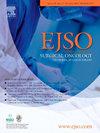Long-term outcomes after postponing surgery to optimise patients with acute right-sided obstructing colon cancer
IF 2.9
2区 医学
Q2 ONCOLOGY
引用次数: 0
Abstract
Aim
To retrospectively analyse the short- and long-term oncological, morbidity and mortality outcomes in patients diagnosed with acute right-sided obstructing colon cancer. Patients who underwent pre-optimisation prior to the oncological resection were compared to patients who did not undergo pre-optimisation.
Methods
All consecutive patients with right-sided obstructing colon cancer, either with a high clinical suspicion or confirmed diagnosis by histological analysis, who underwent curative-intent treatment between March 2013 and December 2020 were included. Patients were divided into two groups: an optimised group and a non-optimised group. Preoperative optimisation included additional nutrition, physiotherapy, and, if needed, bowel decompression. Data about disease-free survival and mortality were collected up to three years after surgery.
Results
Sixty-two patients were included. Thirty patients underwent the optimisation protocol before postponed surgery, and 32 patients received emergency surgery, without optimisation (surgery performed with a median of 9.6 days versus 22 h after admission). The postoperative complication rate was significantly lower in the optimisation group (50 % vs 78 %, p = 0.033). No significant differences were found in the 90-day mortality rate (7 % vs 13 %, p = 0.672) and three-year overall survival rate (43 % vs 56 %, p = 0.49). After three years, sixteen (53 %) patients in the optimised group and twenty (63 %) in the non-optimised were deceased (p = 0.672).
Conclusion
Postponing the surgery with preoperative optimisation in patients with obstructing right-sided colon cancer results in a significantly lower 90-day complication rate and suggests no negative effect on survival rates compared to an acute resection. Although, further research with a larger sample size is needed.
优化急性右侧梗阻性结肠癌患者延迟手术后的长期预后。
目的:回顾性分析急性右侧梗阻性结肠癌患者的短期和长期肿瘤学、发病率和死亡率。在肿瘤切除前进行预优化的患者与未进行预优化的患者进行比较。方法:纳入2013年3月至2020年12月期间所有连续接受治疗的右侧梗阻性结肠癌患者,无论是临床高度怀疑还是经组织学分析确诊。患者分为两组:优化组和非优化组。术前优化包括额外的营养,物理治疗,如果需要,肠减压。手术后3年的无病生存率和死亡率数据被收集。结果:纳入62例患者。30例患者在推迟手术前接受了优化方案,32例患者接受了紧急手术,未进行优化(手术时间中位数为9.6天,入院后22小时)。优化组术后并发症发生率明显降低(50% vs 78%, p = 0.033)。90天死亡率(7%对13%,p = 0.672)和3年总生存率(43%对56%,p = 0.49)无显著差异。三年后,优化组16例(53%)患者死亡,非优化组20例(63%)患者死亡(p = 0.672)。结论:对梗阻性右侧结肠癌患者进行术前优化后推迟手术可显著降低90天并发症发生率,且与急性切除相比,对生存率无负面影响。不过,还需要更大样本量的进一步研究。
本文章由计算机程序翻译,如有差异,请以英文原文为准。
求助全文
约1分钟内获得全文
求助全文
来源期刊

Ejso
医学-外科
CiteScore
6.40
自引率
2.60%
发文量
1148
审稿时长
41 days
期刊介绍:
JSO - European Journal of Surgical Oncology ("the Journal of Cancer Surgery") is the Official Journal of the European Society of Surgical Oncology and BASO ~ the Association for Cancer Surgery.
The EJSO aims to advance surgical oncology research and practice through the publication of original research articles, review articles, editorials, debates and correspondence.
 求助内容:
求助内容: 应助结果提醒方式:
应助结果提醒方式:


